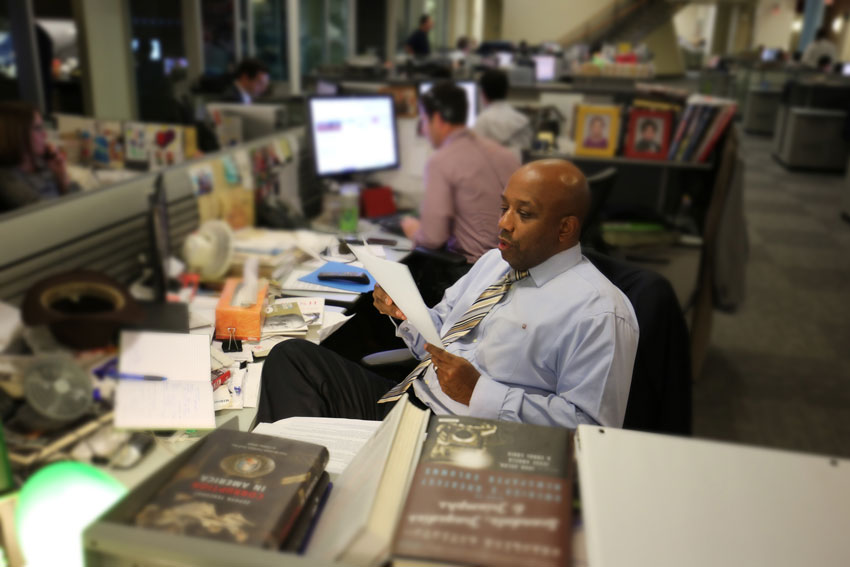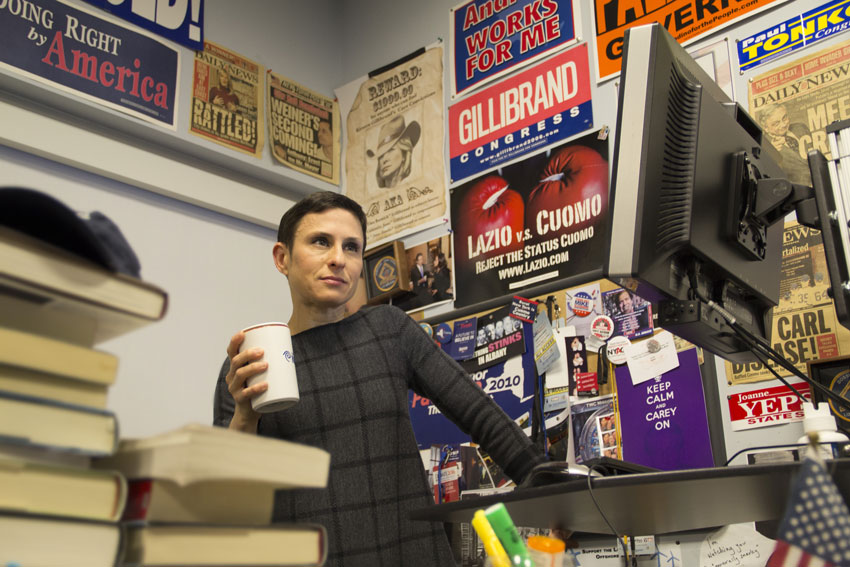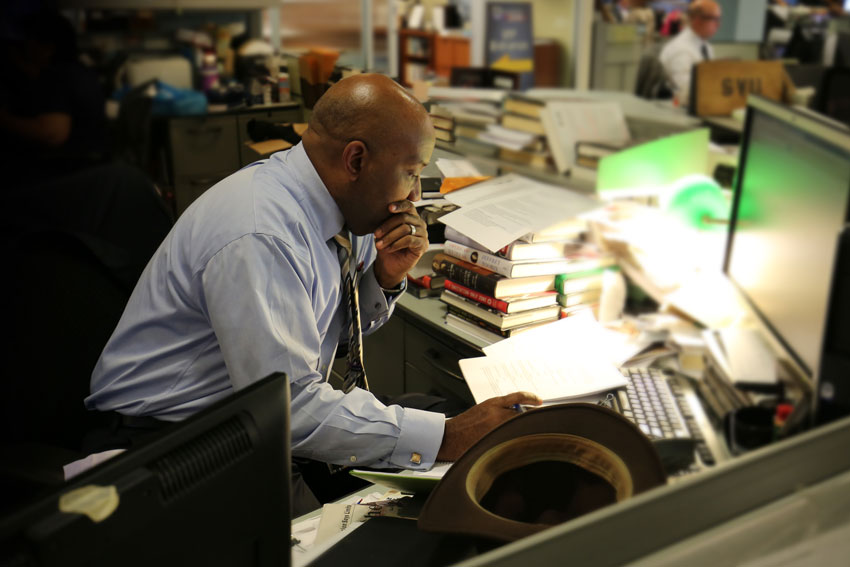Press ReleaseOctober 28, 2016
Reporter's Notebook: Moderating a Political Debate
Share Article:
In the latest installment of our Reporter's Notebook series, we're focusing on what it takes to moderate a debate. This Sunday at 8 p.m. EDT, NY1 political anchor Errol Louis and TWC News political anchor Liz Benjamin will co-moderate the only New York pre-election U.S. Senate debate in the race between Sen. Charles Schumer and Wendy Long.
The 60-minute debate will be broadcast live on TWC News and NY1 in the state of New York and will be held before a live audience at Union College in Schenectady, New York. In advance of the debate, we caught up with Liz and Errol for an inside look at what goes into their preparation.
The Preparation and Practice of Moderating a Debate

Errol Louis, Political Anchor and Host of NY1’s Inside City Hall, prepares at his desk in the newsroom to moderate Sunday's debate.
Charter Newsroom: How are you preparing to moderate the debate?
Liz: Both of us have attended numerous events at which these candidates have spoken or appeared, so we're familiar with them. We've interviewed them before, including during this election cycle. But, speaking for myself, preparation includes doing debates. We've done quite a few congressional debates already ... Also just reading everything we can to be up-to-date on everything these two individuals have said on various pertinent issues and issues that we will be questioning them on.
Errol: And then with all of that in mind, we have to work backwards from the time that we have. This is a 60-minute debate with a handful of commercial breaks. Then you have to deduct some time for opening and closing statements, depending on what the rules are, as well as our own introduction, thanking the host, greeting the audience and so forth. So we have a very tight schedule that we build around these questions. You broadly group them into discussion areas that you would expect a U.S. Senate debate to cover including: jobs and the economy, war and peace, diplomacy, political questions as well as follow-up or in depth questions about whatever the two candidates have been campaigning about over the last few weeks.
Charter Newsroom: Do you have a process for dividing the questions in terms of who will ask what?
Liz: We do, yes. We don't want to give too much away obviously because you don't want to let everybody know exactly what they should be expecting. But we do collaborate quite a bit between the upstate operation and the downstate operation in figuring out, as Errol alluded to, what the areas are of importance and how that keys out a real conversation with real responses and not just chatter from the candidates.
Errol: So if either of us feel strongly about a question, we'll probably take it, but I think we probably feel equally strongly about all of the questions. Once you prepare or once you've been designated to answer a question, then you start doing what you can call gaming out the question. Meaning, what are the likely responses, what have they said on the record, what are they likely to say when asked, and then what would the follow-ups be. You want to try to develop the issue quickly and thoughtfully, so you can get to the core of what the candidates are saying and where they might disagree.
The Debate Rehearsal Process

Liz Benjamin, Political Anchor and Host of TWC News’ Capital Tonight, prepares for Sunday’s debate in her office.
Charter Newsroom: Have you been rehearsing together?
Liz: No. Not yet. Errol and I have worked together for a number of years. I mean we've spent ... I didn't tally the number of hours, but quite a few hours together at the conventions.
Errol: Many, many hours...
Liz: Many hours in pre and post analysis, shows that we've co-hosted for the Hofstra debate, the presidential debate that was held down shore on Long Island. I've watched Errol's show.
Errol: And I watch Liz's...
Liz: I’m very familiar with his approach. So I know the areas that he is strong in and places that I would probably defer to him or look to him to seek his input. It’s definitely a give and take on the shows that we work together and also when we co-moderate.
Errol: I certainly both study the interviews by Liz and also defer to her in depth of knowledge on a lot of issues that are particular to upstate New York. I have to check in with her on these things because it’s what she works on all the time. Especially within this very limited amount of time, think about it, if every topic that we’ve discussed in-depth took let’s say five minutes and that is tightly controlled, we might get ten questions in in the course of a debate. Maybe twelve?
Debate Role Models

In 2013, Errol moderated 13 NYC mayoral debates. "The candidates were joking that if I did one more they’d make me a candidate," he remembers.
Charter Newsroom: In watching the presidential debates this cycle, do both of you plan to try and emulate the style of a particular moderator or are you blocking that out and just going with your style?
Errol: Well, I don’t intend to emulate anybody. I’d say of the ones that I’ve seen so far I think Chris Wallace has been the best moderator because he does what I think works well. What Liz and I try to do, which is to keep control of the conversation. When you let the candidates talk over you or interrupt or go off on tangents too much, or if you let the audience start taking up valuable time with cheering and booing and getting involved, once you lose control of it, that precious time just gets away from you. It really does make for a poor viewing experience and a worse debate.
Liz: I agree with Errol. Also look, both of us have viewers throughout New York and people who've known us for quite some time. Neither of us need to pretend that we're somebody that we're not. But that said, there is also knowing when to let it breathe. There are times for the candidates to go at it and to allow viewers to see what that looks like. Sometimes there are moments when one gets under the other’s skin. The respondent drops his or her carefully managed persona and shows who they really are, and that’s helpful for viewers to see.
Errol: That's true. All of the rules are really just a framework to enable a substantive conversation to happen. If that substantive conversation happens, it's our job to kind of lay back and let it happen.
Pre-Debate Jitters

Liz, seen here on the set of Capital Tonight, began her career as a print reporter for the Albany Times Union.
Charter Newsroom: So this is a special circumstance because you're going to be in front of an audience, and that's not something that you do normally when you host a news show on television. Do you get nervous and do you have a pregame strategy to get yourselves pumped up for an event like this?
Errol: Nervousness is not an issue.
Liz: Most of us do quite of bit of public speaking outside of the studio. We’ve done four or five primary debates, almost all of them in front of live audiences. We’ve done conventions where there is no prompter and there is no script and you don’t know what is going to happen, so you just roll with the punches. Sure there’s a shot of adrenaline when you hear the producer say my cue and … now you’re live and there is no turning back. What happens, happens. If you flub for some reason you just move on. I don’t know that there is any strategy to manage anything other than experience…
Errol: To the extent that I have any pre-debate ritual, it’s that I’m making sure I’ve got all of my tools working. I have a good sound check, I have my iPad, a pen, some paper, and all of the basic tools as well as enough coffee to keep the energy up.
Liz: Also live TV is by nature, unpredictable and certainly we’re both experienced at that. So we’re prepared for any eventuality. You could lose sound, lights or whatever you might lose. You just don’t know what’s going to happen and that is part of the joy and excitement of live TV.
Errol: That’s true. And I don’t know if this has happened with you, Liz, but I’ve certainly had debates where we knew there were protesters in the audience. And we knew they were going to try to disrupt the debate. You just try to make a plan before anything starts. At best, someone that tries to disrupt a debate might inconvenience a few dozen people in the actual arena, in the room, but you should never let too much of that spill out over the airways.
A Strong History as the Moderator
Charter Newsroom: You both are so experienced. Do you have a sense of how many debates you’ve moderated?
Errol: I've done at least fifty.
Liz: He's got a few more years on me, but not that many. Plus in both of our cases, covering them as print reporters, so being on both sides. I've sat in the audience. I've watched them as a viewer. I've been the moderator. The only thing I've not done is participate as a candidate. But I've been in situations where I'm verbally sparring with someone so I'm familiar with that experience as well.
Errol: In 2013, we had a race for mayor. I moderated thirteen different debates for mayor. It was crazy.
Sunday's debate will be broadcast live in New York on channels 1 and 200 on NY1 and channel 200 on TWC News. For the latest New York political coverage, check out the NY1 politics page.